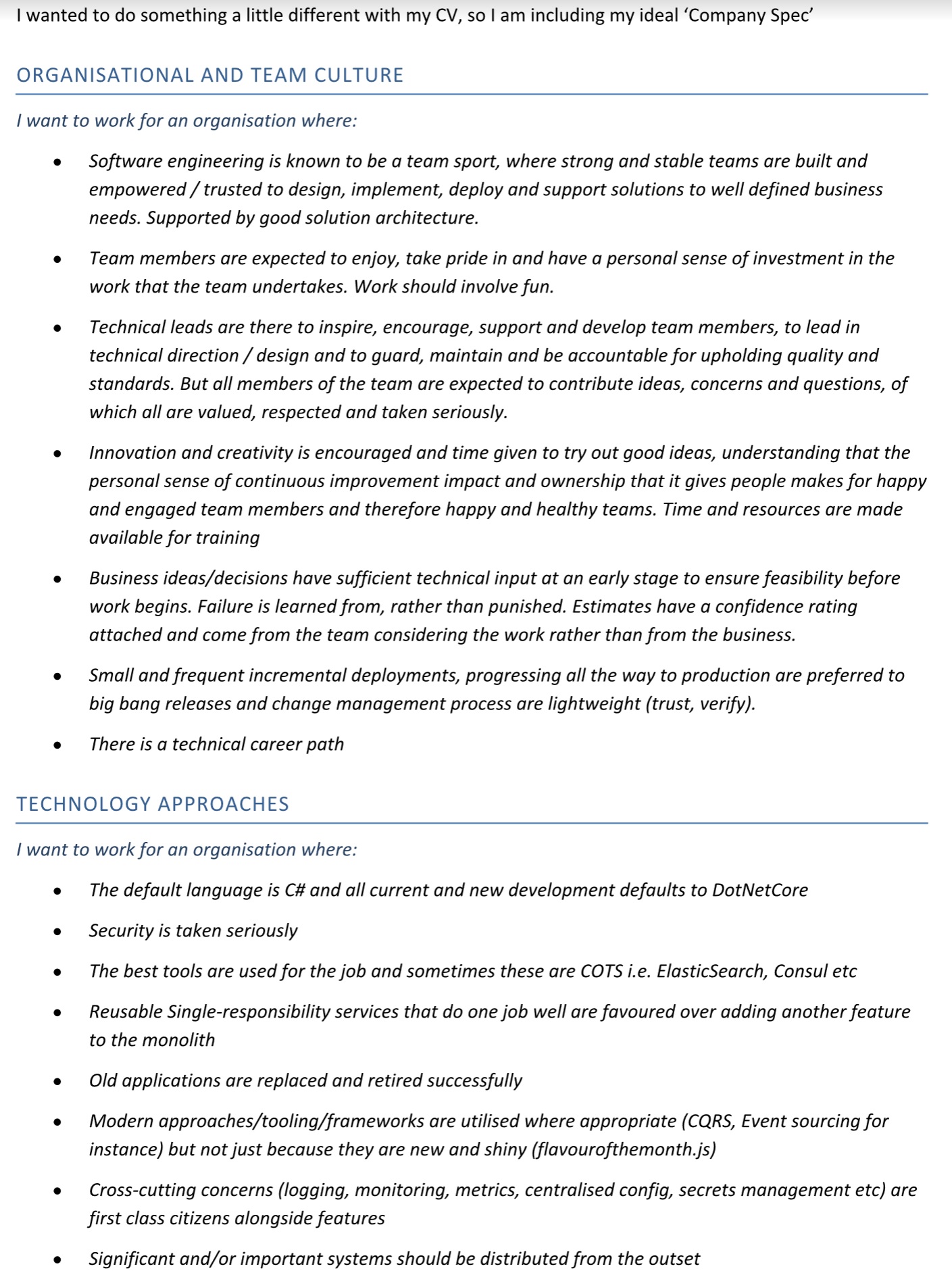Some things happened at work recently which made me wonder whether it was time to think about moving on. I always intended to go to the odd practice interview, but never managed it. So I thought I’d update my CV, change my LinkedIn status and see what happens. I tried out some new ideas with my CV and ended up accepting the offer of a near perfect job (for me) after about 25 working days…
I never intended to stay at one company for 5 1/2 years, but I did get a promotion from senior to lead 3 1/2 years ago and was committed to staying for the duration of a large project which was likely to last another 2 years. The annoying things at work were winding me up quite a lot, to the point of losing sleep. One particular sleepless night, with everything swirling around in my mind, I was wondering how I would try to find my next company.
I had learned through the course of several past jobs and projects quite a few things that I did and did not like, but the tricky bit seemed to be how would I measure a prospective company against those opinions in the time it takes to have an interview? Then I had the idea of creating my ideal ‘Company Spec’, I sat up in bed, fired up my laptop and started typing, exactly one hour later having dumped all my thoughts, I finally dropped off to sleep, feeling much better.
Company spec
What I meant was a set of points describing what I wanted from my next employer in the same way that an employer would describe what they wanted in their next employee in a job spec. I’ll include my actual company spec below.
Firstly, I got positive comments from recruiters, but also positive feedback from the first interesting looking company that I decided to pursue, in fact I discussed several points from the Company Spec with the CTO of that company in the telephone interview that followed and then the face-to-face interview that followed that! I ended up seriously considering and eventually accepting a job with that same company!
I found that my company spec did several things:
- it let the company know that I have opinions and think things though
- it is source of stories to tell - the reasons I have each opinion.
- its a source of questions for me, as you can always take a copy of your CV into an interview and you can refer to it when your mind inevitably goes blank when they ask if you have any questions.
- it let the company weigh themselves up against the points in my list
- it potentially could have helped a thorough recruiter in not wasting my time and theirs on a job which clearly did not compare favourably with my list.
By the end of the interview and certainly by the time I received an offer, we had discussed all of the points in my company spec in detail and to the point that I was pretty sure it was a company I could work for and I think they were fairly sure I was someone they could employ.
Include an interesting side project
The other thing I did was to place a short section about an interesting side project and what progress I’d made with it. In my case I am convinced that private network blockchain can solve the problem of consensus in a distributed system without needing a leader, so I have a project in which I am trying to prove it. I am also using my project to learn about containers and Azure, both of which I haven’t used much in a commercial context. I supposed a decent open source project would be even better, but any interesting project or problem to solve would work. As long as you can talk about it confidently when the questions come, I talked about my intentions for future architecture and some stretch goals. I think this would be especially useful if the projects you have been working on are not utilising modern architectures or design patterns, as it shows awareness of modern thinking and a bit of initiative on your part to go above and beyond to learn them.
Both of these are really just a way of steering the conversation to something you can talk about enthusiastically
My final CV layout was:
- Name, address, basic info etc
- Summary list of languages/technologies with rough estimate of years/months of experience
- Short section on my side project (don’t hide this bit!)
- My Company Spec
- Work experience
- Education
- Short personal statement
The actual company spec section I included
Probably not best to copy mine as you’ll need to talk about them and the experiences good and bad which lead you to the opinion, but this is what worked for me:

In Conclusion
I’m not saying that my company spec and side project sections in my CV got me my new job, but they certainly helped with the content of the conversations in the two interviews I had and certainly left me feeling confident about the ‘fit’ of the company for me. This was definitely the smoothest recruiter->telephone->face-to-face->offer->negotiation->acceptance process I’ve ever had. I have notice to work before I can start my new job and we will have to wait and see how things go but I’m feeling very excited about it!